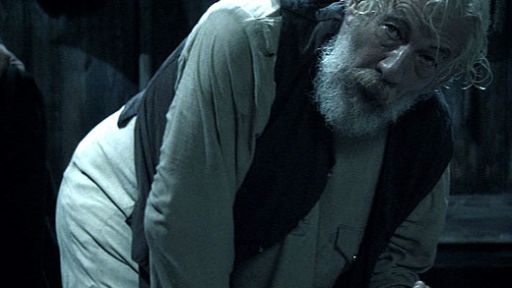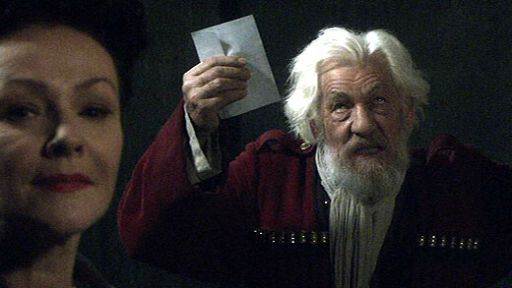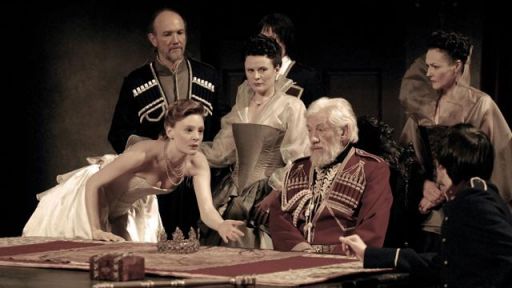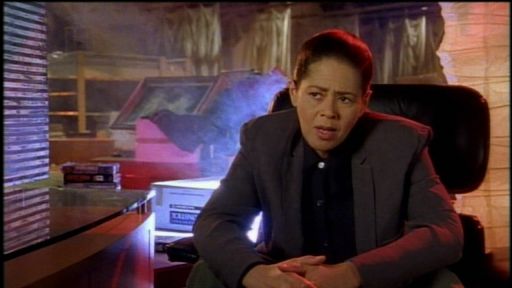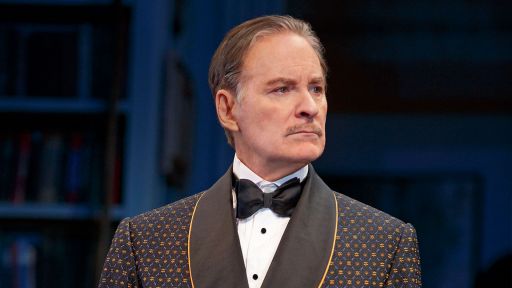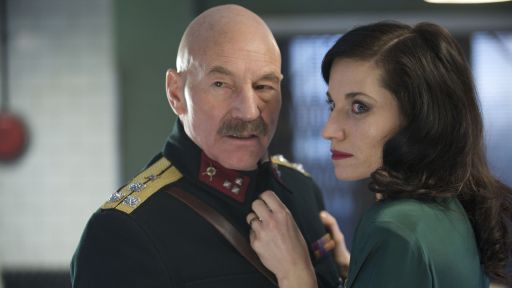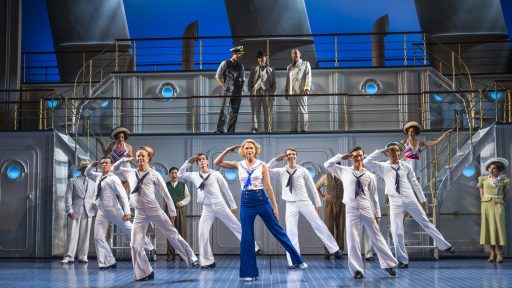The King Lear section of the Great Performances site owes its existence to the PBS broadcast of the film directed by Trevor Nunn and starring Ian McKellen. For the better part of 2007 the two produced and performed King Lear on stage, first at Stratford-on-Avon as the last in the Royal Shakespeare Company’s staging of Shakespeare’s entire catalog of plays, then around the world. They then filmed the play at studios in London for BBC and PBS television audiences. An English version was released on DVD in late 2008, followed by an American version. It may be found at www.shoppbs.org
Other Films
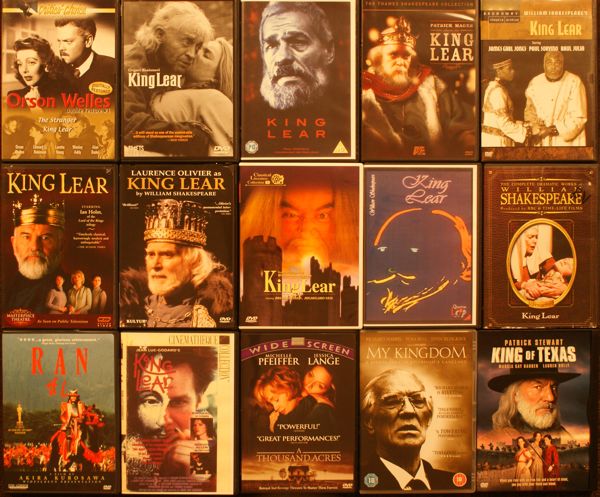
There are presently ten film versions of King Lear on DVD. Each is worthwhile, but each differs from the others, at times considerably. For a first film, one should not choose Orson Wells or Paul Scofield; both radically reimagine the play, but in different ways. Rather, one should see the more traditional treatments of Ian Holms or Lawrence Olivier (or, soon, Ian McKellen if you miss the PBS broadcast of 25 March). However, after the first taste, one should see the Kozintsev Russian version, Schofield (really Peter Brook) in the darkest version, and Orson Wells (also directed by Brook) in a version without the second plot (to save TV time), but with the words spoken like no other. Of note is the play with James Earl Jones, the only one filmed as a stage performance (in Central Park), and hence with audience sounds.
The McKellen version is available from ShopPBS. Next year Anthony Hopkins and Al Pacino will release their versions of King Lear for theaters, both in performances that began life as screen plays, not stage plays.
- 1953 Orson Welles as Lear, Andrew McCullough and Peter Brook, directors
- 1971 Paul Scofield as Lear, Peter Brook director
- 1971 Juri Jarvet as Lear, Grigori Kozintsev director, in Russian, music by Shostokovic
- 1974 Patrick Magee as Lear, Tony Davenall director
- 1974 James Earl Jones as Lear, Edwin Sherin director
- 1982 Michael Hordern as Lear, Jonathon Miller director
- 1982 Mike Kellen as Lear, Mike Kellen director
- 1985 Lawrence Olivier as Lear, Michael Elliot director
- 1998 Ian Holm as Lear, Richard Eyre director
- 1999 Brian Blessed as Lear, Brian Blessed director
- 2007 Ian McKellen as Lear, Trevor Nunn director
- 2010 Anthony Hopkins as Lear, Joshua Stern director
- 2010 Al Pacino as Lear, Michael Radford director
King Lear has also been adapted to other stories or forms, most notably in Akira Kurosawa’s Ran (which means “chaos”)
- 1983 The Dresser, Albert Finney, Peter Yates director
- 1985 Ran, Akira Kurosawa director
- 1987 King Lear, Jean Luc-Godard director
- 1997 A Thousand Acres, Jason Robards, Jocelyn Moorhouse director
- 2001 My Kingdom, Richard Harris and Lynn Redgrave, Don Boyd director
- 2002 King of Texas, Patrick Stewart as John Lear, Uli Edel director
- 2007 Baby Cakes Sees a Play, Brad Neely (Internet only)
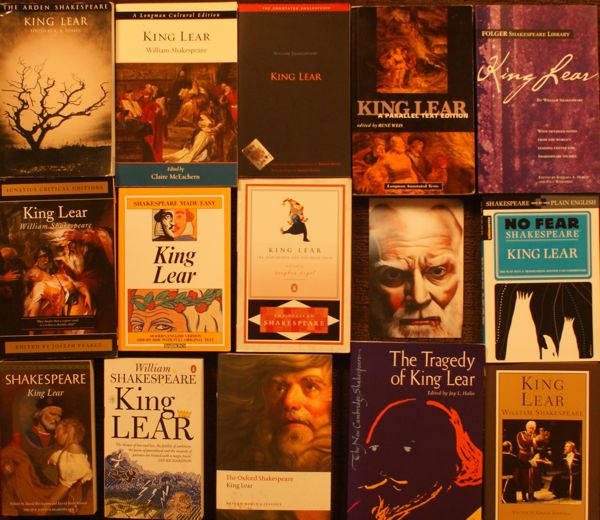
We have two source texts for King Lear, a Quarto published in 1608 during Shakespeare’s lifetime (but without Shakespeare’s supervision) and a Folio published in 1623 seven years after Shakespeare died. They differ considerably. Many modern editors conflate the two, creating a third text. All film versions and almost all stage versions of King Lear begin with a conflated text and cut from there (almost no one does the whole four-hour thing). The recommendations below only cover conflated texts. See detail pages for other editorial treatments.
Reading Editions
The following texts provide some introductory material, clean texts, and annotations for unfamiliar words on pages facing the text pages. They are inexpensive.
- King Lear, Bantam, David Bevington, edit
- King Lear, Washington Square Press (Folger Library), Barbara Mowat and Pual Werstine, editors (Amazon does not recognize “Folger” as a publisher)
Academic Texts
The following texts either provide much deeper material in copious footnotes (Arden) or a significant number of critical essays (Norton). For serious Shakespeare reading of King Lear, one should have a reading text from above and both the Arden and Norton (supposing one is not interested in the two-text question itself). For what they are, the are inexpensive.
- King Lear, Norton, Grace Ioppolo, editor
- King Lear, Arden, R. A. Foakes, editor
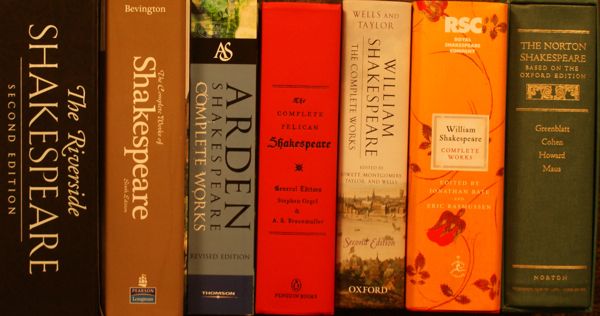
Complete Works
There are seven in-print editions of Shakespeare’s complete dramatic works (with some including his poetry). Five provide a conflated text. Each provides footnotes for unfamiliar words or phrases.
- The Complete Works of Shakespeare, Pearson/Longman, David Bevington, editor
- The Norton Shakespeare Based on the Oxford Edition, Greenblatt, Cohen, Howard, Maus editors
- The Riverside Shakespeare, Evans and Tobin, general editors
- The Complete Pelican Shakespeare, Stephen Orgel and A. R. Braunmuller, editors
- The Arden Shakespeare, Proudfoot, Thompson, and Kastan, editors

